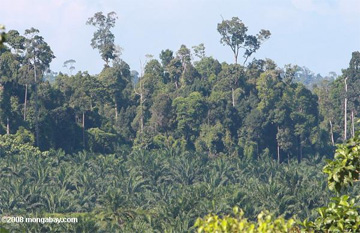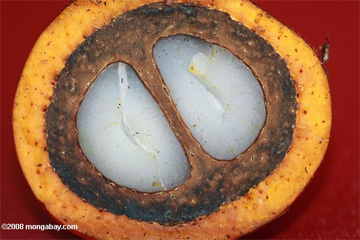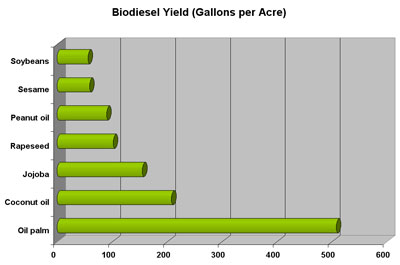|
|
Dr. Yusof Basiron, CEO of the Malaysian Palm Oil Council, the government-backed marketing arm of the Malaysian palm oil industry, claims on his blog that endangered orangutans benefit from living in proximity to oil palm plantations. Environmentalists scoff at the notion, maintaining that oil palm expansion is one of the greatest threats to orangutans.
In an April blog post, Basiron cited an unspecified study that found “orang utans living near oil palm plantations were observed to regularly visit the plantations to feed on loose oil palm fruitlets and benefit from an all year round availability of a healthy food source which is naturally rich in vitamin A and E, giving the orang utans a healthy shining coat.”
But David Dellatore, a researcher with the Sumatran Orangutan Society, questioned Basiron’s claims, saying that he was unaware that any such study had been published in a legitimate scientific journal: “It’s of no value to cite a mystery study.”
 Young orangutan at Sepilok rehabilitation center in Sabah, Malaysia. Some plantation companies have become supporters of orangutan care facilities, which house orangutans displaced by oil palm expansion. |
He added that workers have been known in the past to kill orangutans encountered on plantations (in Indonesian Borneo there still regular reports of workers injuring or killing orangutans) and that oil palm expansion is a leading driver of deforestation in Malaysia and Indonesia, rather than an important source of nourishment for apes.
Dellatore told mongabay.com during a visit to Medan, Sumatra that it is unlikely that orangutans would count palm fruits from plantations as an important food source.
“A colleague has found instances in a population isolated from the main forest where orangutans have occasionally eaten palm fruits as a fall back/emergency food. However in no way is palm oil a preferred (or common) orangutan food and given the choice between that and fruit or other naturally occurring foods they would not be eating oil palm. We don’t know of any other population of orangutans that eats from oil palm, apart from this population that is isolated from returning to the forest.”
Further, Dellatore said that plantation workers would likely kill orangutans they see in plantation areas.
 Oil palm and rainforest in Sabah, Malaysia |
“Orangutans or any other species coming onto plantations would be regarded as pests who are lessening the profits of the plantation, or in the case of a small-holder, putting their livelihood at risk.” explained. “They may be dealt with as any other pest species is anywhere else in the world – destroyed or perhaps captured and sold into the pet trade. The expansion of plantations has increased the incidence of conflict between humans and orangutans. The problem is worsened when there are no buffer zones or mitigation strategies in place.”
He was also skeptical of the claimed health benefits of palm oil for orangutans.
“Per the shiny coat business – if there’s been a study on the effect of oil palm consumption on orangutan nutrition and coat condition, nobody I know has ever heard of it or read it!”
It is not the first time Basiron has made controversial claims. At a sustainability conference sponsored by the Malaysian Palm Oil Council in April 2008, Basiron said that the Malaysian palm oil industry has “always” been sustainable and hasn’t been responsible for any deforestation, despite clear evidence that some oil palm expansion has occurred at the expense of natural forests. He also made dubious remarks on biodiversity.
  As the world’s oil palm is the highest-yielding commercial oilseed, palm oil production offers more vegetable oil per unit of area than other widely-grown crops including soy, canola, or rapeseed. Thus oil palm expansion on abandoned agricultural lands could offer producers a more effective way to sustainably meet growing demand for vegetable oils than with other oilseeds. Environmentalists are most concerned by palm oil production that comes at the cost of carbon-dense and biologically-rich rainforests and peatlands. |
“All land can be reforested. There is no reason why you just can’t plant a new forest,” he said, ignoring the difficulty of re-establishing forests on degraded lands or regenerating the sort of forest needed to support high levels of biodiversity. Scientists say oil palm plantations are biological deserts relative to even heavily logged forests, but Malaysia classifies plantations as forested lands.
“With deforestation, all the animals move to the forest,” he claimed. “They don’t die.”
Despite his remarks, the Malaysian Palm Oil Council is a supporter of the Roundtable on Sustainable Palm Oil (RSPO), an industry-led initiative to clean up the palm oil industry. Although RSPO has been subject to criticism by some activist groups, many conservationist organizations—including some who sit on the RSPO’s managing board—believe the initiative can eventually improve the environmental performance of palm oil producers by offering them financial incentives for mitigating deforestation, social conflict, and pollution.
Related articles
(11/11/2008) Scientists should compare the biodiversity oil palm plantations to other industrial monocultures, not the rainforests they replace, said Dr. Yusof Basiron, CEO of the Malaysian Palm Oil Council (MPOC), in a post on his blog. Basiron’s comments are noteworthy because until now he has maintained that oil palm plantations are “planted forests” rather than an industrial crop.
Palm oil industry relies on greenwashing to mislead consumers, alleges report
(10/08/2008) The Malaysian palm oil industry is relying on marketing tactics that mislead the public about its environmental performance rather than taking effective steps to become “greener” alleges a new report from the environmental group Friends of the Earth (FOE).